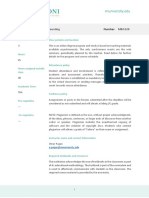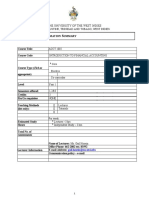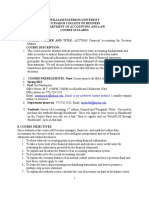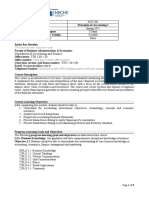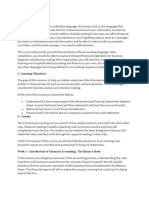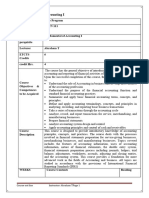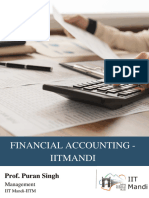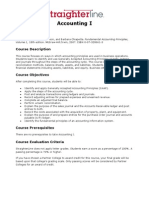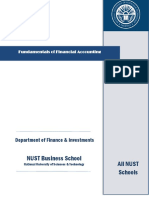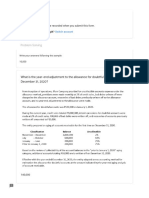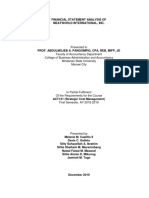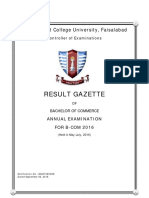Course Syllabus
Accounting for Decision Making
Gregory S. Miller, Ernst and Young Professor
Ross School of Business, University of Michigan
Overview
Welcome to "Accounting for Decision Making." This course is inspired by the material used in
the Ross (University of Michigan) Business School's introduction to accounting core course.
That is one of the first courses taken from the MBA's there. We cover the same basic topics, but
here we focus more on getting down the overall structure of understanding accounting. If you
were to take my course on campus, we would have more time to explore the nuances in an
interactive setting. Both are important, and my goal here was to make the best use of this online
setting.
First, before you start, it is probably useful for you to know a few things about the course
structure. We will begin the course with an overview week where we explore the goal of
accounting, why we have financial statements, and other basic principles of accounting. I will
also show you how all of accounting comes from common sense; sometimes accountants just
mess that up with jargon. We will fix that in this course. Then we switch to a week getting into
bookkeeping details. That is not the most exciting stuff, but similar to learning basic math tables
in grade school, it is a skill you need to get to the really cool stuff. Plus, by the end of that second
week you will have a pretty good idea of how financial statements work. That alone is worth
taking the course.
After getting that big-picture view, we will switch to several weeks of digging into topics in
detail. For example, we will look closely at revenue recognition, accounting for long-lived
assets, and goodwill. We will generally cover two of those topics a week. For each topic, we will
explore the overall economics of the issue, how accounting attempts to capture those economics,
and the factors that can make that difficult. We will also lay out the bookkeeping. By the end of
the detailed sessions, you will have built up specific knowledge about those items, but also
created a thought process for understanding accounting in general. That way, you can approach
new topics as you run into them later in life.
We will end the course by going back to a bigger-picture view. That starts with returning to the
level of financial statements to learn about the cash flow statement (I guarantee it is not what you
think it is). Then we will move on to ratios, with a focus on how to apply all you have learned
�about accounting, so you can create ratios to answer any question you encounter. We will end
with a comprehensive exam, just to make sure it all came together.
Second, you will see there are multiple lessons per week. The topics within each lesson are
related. Each lesson begins with a short reading that lays out the goals of that lesson and often
discusses the number of videos, etc. You can do the course without reading any of these, but I
always like to know where we are headed, and I included these for those of you who are similar.
They won't take much time.
Third, I have included practice quizzes and questions in each lesson. Some of the questions are
straightforward applications of the concepts we covered. Others are a little trickier. I have
provided explanations on all of them. I really encourage you to spend time to focus on these
quizzes. It will help solidify your learning. Many of the questions are based on my experience of
what students are most likely to misunderstand even after I have covered the material. This is a
chance to identify and correct those types of items.
Fourth, at the end of each module there is a "graded" test for the material in that module. There
is also a comprehensive graded test at the end. Those questions are more straightforward. If you
have worked through the practice quizzes, nothing there should surprise you.
Finally, I know Coursera often designs courses that can be done entirely on a small screen, such
as a mobile phone. While that will work for some parts of this course, one of the values of
accounting is how it shows connections across activities. To demonstrate that visually requires
space and detail. So, I think you will find that many of the videos benefit from being watched on
a tablet or larger-sized screen.
Grading
I provide plenty of practice quizzes, usually one per lesson. Those quizzes are not graded.
However, as mentioned above, they will help you prepare for the graded quizzes. They will also
help you learn the material better, which is an even better reason to do them. In fact, several of
the questions are based on topics that I know my students often get wrong even after we have
discussed them in lecture. It seems at times people need to learn from their own mistakes rather
than from being told something.
So what is graded? At the end of each module there is a graded quiz. You must pass each of
these to get a certificate for the course. You can take the quiz twice each day – so if it does not
go well the first time you will have chances to retake it. This is consistent with mastery learning,
which allows you to keep working until you get mastery of a topic. In addition to needing to
pass each quiz, they will be weighted in your final course grade – counting for 10% each (so
70% combined).
�There is also a comprehensive final quiz. It will probably take you an hour or two. It is no
tougher than the individual quizzes, but is a chance to revisit all the material one last time. It
also can be taken up to two times a day. In addition to passing that quiz on its own, it counts for
30% of your final grade.
Topics
The course is designed to be a seven week exploration of accounting. Each week is a “module”.
It is a lot of material to cover in seven weeks, but better to run through fire than to walk through
it. Maybe that is not creating the right frame of mind, let me try again. It is a lot of material, but
by being consistent you will build a skill that will last a life time. That is a pretty big
accomplishment in just seven weeks. If it seems too fast for you, it is perfectly fine to take it at
your own pace. I have been careful to design a course that can be managed in seven weeks, but
some people may take a little longer and others may get excited and do it faster. In any case, the
major topics are:
Module One
What is the goal of accounting?
Why accounting is commonsense that really comes naturally to all of us.
What are the primary financial statements and how do they help me understand a
business?
What are debits, credits, journal entries, T-accounts and other bookkeeping tools?
Module Two
Understanding the accounting cycle, from individual transactions to a set of financial
statements.
Fair warning, this is the most boring topic and one that will take some time. But once you have
basic bookkeeping skills down, the world of accounting opens up quickly. It is worth the
investment to get a tool that helps you really understand companies.
Module Three
Revenue recognition
Bad debt expense and allowance for doubtful accounts
Inventory accounting and cost of goods sold accounting including LIFO/FIFO cost flow
assumptions
�Module Four
Long-lived tangible assets, depreciation and changes in estimates
Gains and losses
Intangible assets and amortization
Goodwill accounting
Impairments
Module Five
Standard and contingent liabilities
Deferred revenue
Equity accounting
Treasury stock
Module Six
Cash flow statements
Indirect cash flow statements
Changes in working capital approach to cash flow statements
Module Seven
Ratios, how to make them, how to use them and how to THINK about them
Comprehensive test




